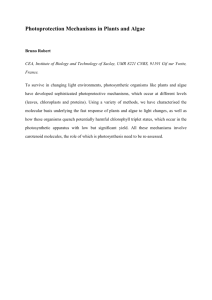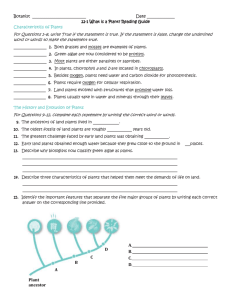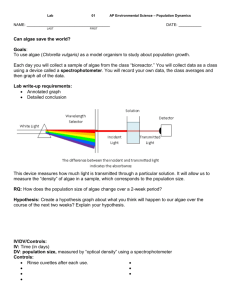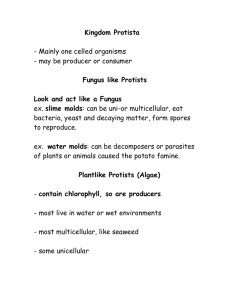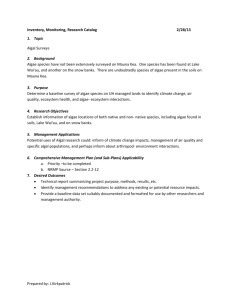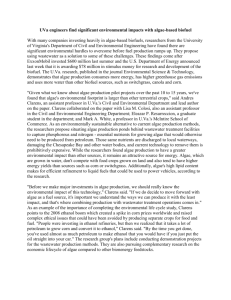Knight - Assignment 7
advertisement
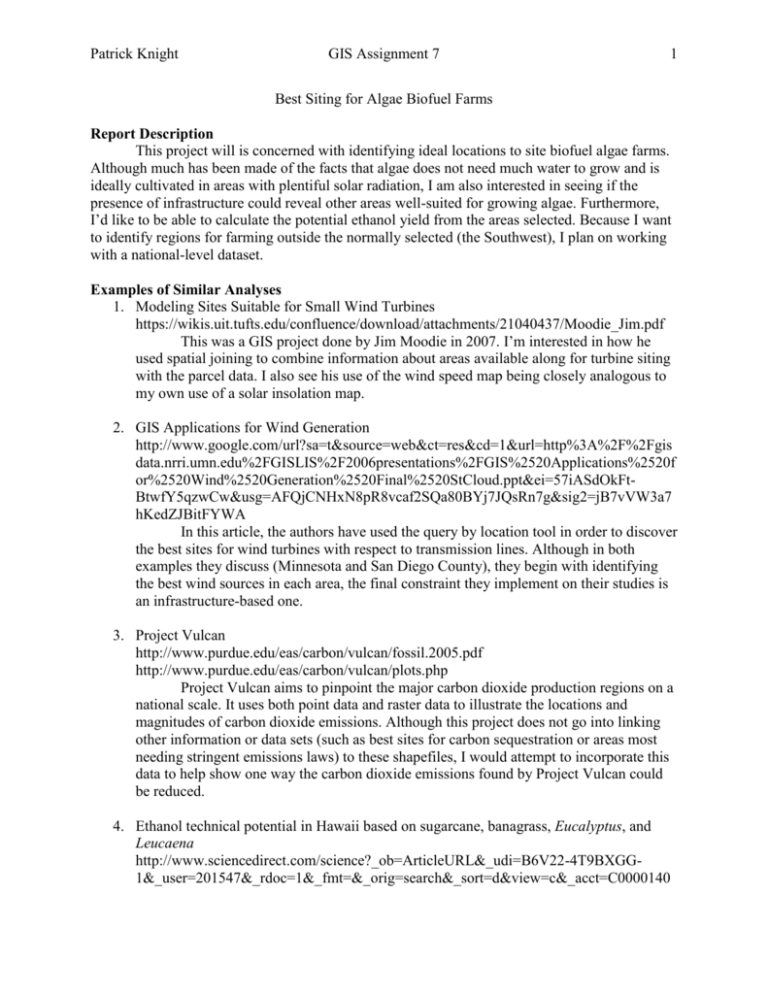
Patrick Knight GIS Assignment 7 1 Best Siting for Algae Biofuel Farms Report Description This project will is concerned with identifying ideal locations to site biofuel algae farms. Although much has been made of the facts that algae does not need much water to grow and is ideally cultivated in areas with plentiful solar radiation, I am also interested in seeing if the presence of infrastructure could reveal other areas well-suited for growing algae. Furthermore, I’d like to be able to calculate the potential ethanol yield from the areas selected. Because I want to identify regions for farming outside the normally selected (the Southwest), I plan on working with a national-level dataset. Examples of Similar Analyses 1. Modeling Sites Suitable for Small Wind Turbines https://wikis.uit.tufts.edu/confluence/download/attachments/21040437/Moodie_Jim.pdf This was a GIS project done by Jim Moodie in 2007. I’m interested in how he used spatial joining to combine information about areas available along for turbine siting with the parcel data. I also see his use of the wind speed map being closely analogous to my own use of a solar insolation map. 2. GIS Applications for Wind Generation http://www.google.com/url?sa=t&source=web&ct=res&cd=1&url=http%3A%2F%2Fgis data.nrri.umn.edu%2FGISLIS%2F2006presentations%2FGIS%2520Applications%2520f or%2520Wind%2520Generation%2520Final%2520StCloud.ppt&ei=57iASdOkFtBtwfY5qzwCw&usg=AFQjCNHxN8pR8vcaf2SQa80BYj7JQsRn7g&sig2=jB7vVW3a7 hKedZJBitFYWA In this article, the authors have used the query by location tool in order to discover the best sites for wind turbines with respect to transmission lines. Although in both examples they discuss (Minnesota and San Diego County), they begin with identifying the best wind sources in each area, the final constraint they implement on their studies is an infrastructure-based one. 3. Project Vulcan http://www.purdue.edu/eas/carbon/vulcan/fossil.2005.pdf http://www.purdue.edu/eas/carbon/vulcan/plots.php Project Vulcan aims to pinpoint the major carbon dioxide production regions on a national scale. It uses both point data and raster data to illustrate the locations and magnitudes of carbon dioxide emissions. Although this project does not go into linking other information or data sets (such as best sites for carbon sequestration or areas most needing stringent emissions laws) to these shapefiles, I would attempt to incorporate this data to help show one way the carbon dioxide emissions found by Project Vulcan could be reduced. 4. Ethanol technical potential in Hawaii based on sugarcane, banagrass, Eucalyptus, and Leucaena http://www.sciencedirect.com/science?_ob=ArticleURL&_udi=B6V22-4T9BXGG1&_user=201547&_rdoc=1&_fmt=&_orig=search&_sort=d&view=c&_acct=C0000140 Patrick Knight GIS Assignment 7 2 58&_version=1&_urlVersion=0&_userid=201547&md5=8ac3374de4bb0f187763569ab1 d39b0b This paper discusses best sites for different crops used in biomass production in Hawaii based on GIS analysis. Using a land suitability analysis, weights and ranks for different constraints were utilized to determine these best sites. One part of this report I find especially interesting is that it uses data on average crop yields to calculate the amount of biomass and ethanol that would be created with the recommended sites. Methods I plan on using attribute and location-based queries to identify the best sites for algae with respect to insolation and infrastructure. Similar to the article “Using the conceptual model to create a suitability map”, I’d like to show not just Boolean true and false areas, but areas of intermediate suitability. Additionally, I will be using geocoding and spatial joins to link information on carbon dioxide emitters and sewage treatment facilities to be used in these queries. I would like to end up with a density map – one that shows the concentration of ideal variables for algae cultivation and one that shows the highest potential yields for ethanol production. I am, however, open to other ideas about ways to display my final results most effectively. Data Layers Needed As all this data will be done on a national scale, high spatial accuracy is not especially needed. As long as the data is accurate to the county level, I would find it acceptable. Solar insolation shapefile Carbon dioxide emitters shapefile Sewage treatment sites shapefile National highways shapefile Electricity transmission lines shapefile


